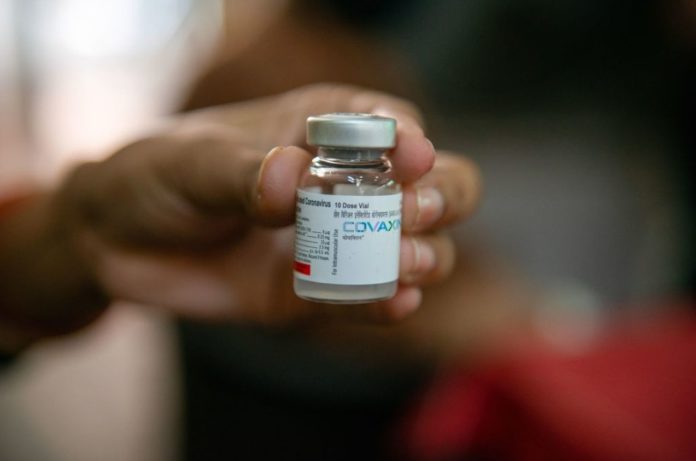The first real-world review of the Bharat Biotech BBV152 COVAXIN vaccine, an Indian COVID-19 vaccine, reveals two doses are 50% effective against symptomatic COVID-19.
The paper, which was published in the journal The Lancet Infectious Diseases, looked at 2,714 hospital workers from the All India Institute of Medical Sciences (AIIMS) in Delhi, India, between April 15 and May 15, 2021, who were symptomatic and had RT-PCR testing for COVID-19. During the study period, the delta type was the dominant strain in India, accounting for roughly 80% of all confirmed COVID-19 cases.
Bharat Biotech BBV152 COVAXIN vaccine
BBV152 vaccine, made by Indian Bharat Biotech, is a Vero cell-derived, inactivated whole-virion vaccine formulated with a novel adjuvant and administered in a two-dose regimen, 28 days apart.
BBV152 was certified for emergency application in India in January 2021 for patients aged 18 and up. In November 2021, the World Health Organization (WHO) added BBV152 to its list of approved COVID-19 vaccines for emergency use.
This new study was undertaken in a high-exposure population (healthcare professionals) who were primarily administered the BBV152 vaccine during India’s second COVID-19 surge, providing a unique chance to evaluate its real-world effectiveness.
“Our study offers a more complete picture of how BBV152 performs in the field and should be considered in the context of COVID-19 surge conditions in India, combined with the possible immune evasive potential of the delta variant,” said Dr Manish Soneja, Additional Professor of Medicine at AIIMS in New Delhi.
The research was conducted at AIIMS, a tertiary care hospital that also serves as a COVID-19 treatment center. Beginning January 16, 2021, the hospital’s COVID-19 immunization center offered BBV152 to all of its 23,000 employees. Between April 15 and May 15, 2021, researchers ran a test-negative control study to assess the efficiency of the BBV152 vaccination against symptomatic RT-PCR confirmed SARS-CoV-2 infection.
SARS-CoV-2 infection was found in 1,617 of the 2,714 employees in the research, whereas 1,097 were negative. Based on age and gender, positive cases were matched 1:1 to negative RT-PCR tests (controls). Cases and controls were examined for occupational exposure to COVID-19, previous SARS-CoV-2 infection, and infection dates, and the odds of vaccination with BBV152 were calculated.
After two doses of BBV152, with the second dose delivered 14 or more days before performing RT-PCR testing, the adjusted vaccination efficacy against symptomatic COVID-19 was 50%. During the seven-week follow-up period, the efficacy of two vaccine doses remained steady.
During the first 20 days of the 30-day research, when the test positivity rate for COVID-19 was at its highest in India, the majority of eligible participants were tested for SARS-CoV-2 infection. As the study progressed, the number of requests for testing decreased (from May 6 to May 15). For those who received one dosage, the median time between receiving the final vaccine dose and the conclusion of the study period (May 15, 2021) was 37 days (range 7 to 119), and for those who received two doses, the median time was 50 days (range 5 to 103) days. The adjusted vaccination efficacy of the first dose was low, which is comparable with other vaccines’ performance against the delta variant and highlights the requirement of a second dose to achieve vaccine effectiveness.
“Findings from the study confirm previous research indicating that two doses of BBV152 are required to achieve maximum protection and that all vaccine roll-out plans must follow the recommended dosing schedule,” said Dr Parul Kodan, Assistant Professor of Medicine at AIIMS in New Delhi.
As real-world performance typically differs from controlled trial conditions, a post-licensure assessment of vaccination effectiveness in a real-world environment is a crucial component of any vaccine roll-out plan. Indeed, the authors admit that the vaccine’s efficacy in this research is lower than that found in a previously published phase 3 randomised control study of BBV152.
The authors speculate that a number of reasons may have contributed to the study’s reduced vaccine effectiveness. To begin with, this study only included hospital staff, who may be at a higher risk of COVID-19 infection than the general public. Second, the study was conducted at the peak of India’s second wave of COVID-19, when both hospital staff and Delhi residents had high test positivity rates. Finally, the presence of circulating variations of concern, particularly delta, may have hampered BBV152’s efficiency.
Limitations
Most significantly, this study did not measure vaccine effectiveness against hospitalization, severe sickness, or mortality, all of which need to be evaluated further. Furthermore, the study was not designed to investigate if vaccine effectiveness varied over time or to estimate vaccine effectiveness for different time intervals after vaccination. Another drawback was the lack of information on comorbidities and prior COVID-19 infection, both of which could influence health-seeking behavior and vaccine effectiveness. RT-PCR positive patients were not tested for SARS-CoV-2 variations during the investigation, which took place during the peak of the delta variant. As a result of a specific variation, the scientists were unable to determine the vaccine’s efficiency against symptomatic COVID-19. The vaccination escape potential of the delta version should be investigated in future investigations.
“Our study took place when the COVID-19 test positivity rate in Delhi was around 35% – the highest since the beginning of the pandemic. It is an important factor to consider while interpreting the impact of any vaccine,” acknowledged Professor Naveet Wig, Head of Medicine at AIIMS, New Delhi.
Source: 10.1016/ S1473-3099(21)00674-5
Image Credit: Getty
You were reading: Bharat Biotech BBV152 COVAXIN vaccine against symptomatic COVID-19 in India: Review
